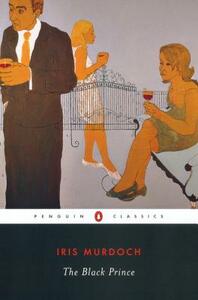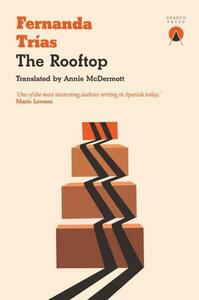Take a photo of a barcode or cover
peytonaaa's Reviews (926)
reflective
"At that time I did well, my fingers
were eaten down to the blood.
They never healed.
The word nightshade a shadow,
the colour of a recurring dream
in which you cannot see colour.
Porridge, worn underwear, wool
stockings, my fault. Not purple: some
other colour. Sick
outside in a snowbank.
I dreamed of falling from the bridge,
one hand holding on, unable to call.
In other dreams, I could step into the air.
It was not flying. I never flew."
were eaten down to the blood.
They never healed.
The word nightshade a shadow,
the colour of a recurring dream
in which you cannot see colour.
Porridge, worn underwear, wool
stockings, my fault. Not purple: some
other colour. Sick
outside in a snowbank.
I dreamed of falling from the bridge,
one hand holding on, unable to call.
In other dreams, I could step into the air.
It was not flying. I never flew."
reflective
tense
"Every man is tiny and comic to his neighbour. And when he seeks an idea of himself he seeks a false idea. No doubt we need these ideas, we may have to live by them, and the last ones that we will abandon are these of dignity, tragedy and redemptive suffering... And indeed our highest moments may find us still the hero of such conceptions. But they are false conceptions all the same."
emotional
mysterious
reflective
"Sacrifice is a stupid thing that
women do.
Don't do it.
The men don't notice.
And all the women around you
spend their lives mopping you up."
women do.
Don't do it.
The men don't notice.
And all the women around you
spend their lives mopping you up."
dark
emotional
reflective
"I saw everything relating to him as he would have liked to create it for himself. When his mind seemed absent, I followed him, yes I, in strange and complicated actions, very far, good or bad: I was certain of never entering his world. How many hours of the night, beside his dear sleeping body I kept watch, trying to understand why he so longed to escape reality. Never a man had such a wish. I realized,—without any fear for him,—that he could be a serious danger to society. Perhaps he has some secrets for changing life? No, I would say to myself he is only looking for them... Sometimes, chagrined and sad, I said to him: 'I understand you.' He would shrug his shoulders."
challenging
informative
I had to figure out how to use Python to OCR my shitty PDF of this book but it was 100% worth it, extremely informative and thought-provoking.
My favorite essays were: A Warlord's Fresh Attempt at Empire by D.H.A. Kolff; The Formulation of Imperial Authority under Akbar and Jahangir by J.F. Richards; The Agrarian System of Mughal India: A Review Essay by Tapan Raychaudhuri; Zamindars under the Mughals by S. Nurul Hasan; Lower-class Uprisings in the Mughal Empire by Wilfred Cantwell Smith; Conformity and Conflict: Tribes and the 'Agrarian System' of Mughal India by Chetan Singh. In particular, the Smith and Singh essays examine aspects of Mughal history that are often overlooked (peasant life for Smith, tribal communities for Singh.)
"In fact, almost all modern historians [of the Mughal Empire] have noted that the revenue was taken from the lower classes against their will. But they have failed to interpret this fact, or even much to consider it. We may choose almost any modern writer at random. Thus, Sir Jada Nath Sarkar, speaking of what he calls 'the Indian peasant’s habitual reluctance to pay revenue,' remarks: 'A careful student of Indian history is very much struck by the chronic antagonism between the rent-payer and the rent-receiver from very ancient times. European travellers in India have noticed how the ryot [peasant land-cultivator] was averse to paying even his legitimate rent and that force had to be employed to get from him the dues of the State.' (The use of the word 'legitimate' betrays this writer's social bias.) ...
... And so on. The fact is that (in India as in the rest of the world) the relation of the upper class and the lower class was one primarily of conflict, and, in technical terms, of exploitation—that is the upper class expropriated from the lower a portion of the produce of their labour. Certainly there was at times sympathy from the nobles for the peasants, or alms, or redress of grievances. But the basic fact is that the villagers were having a portion of their little wealth regularly taken from them by their rulers, and they did not like it. Here then is the class struggle; permeating the whole of Mughal society, underlying all its aristocratic culture, colouring all its peasant life."
—Wilfred Cantwell Smith, "Lower-class Uprisings in the Mughal Empire"
My favorite essays were: A Warlord's Fresh Attempt at Empire by D.H.A. Kolff; The Formulation of Imperial Authority under Akbar and Jahangir by J.F. Richards; The Agrarian System of Mughal India: A Review Essay by Tapan Raychaudhuri; Zamindars under the Mughals by S. Nurul Hasan; Lower-class Uprisings in the Mughal Empire by Wilfred Cantwell Smith; Conformity and Conflict: Tribes and the 'Agrarian System' of Mughal India by Chetan Singh. In particular, the Smith and Singh essays examine aspects of Mughal history that are often overlooked (peasant life for Smith, tribal communities for Singh.)
"In fact, almost all modern historians [of the Mughal Empire] have noted that the revenue was taken from the lower classes against their will. But they have failed to interpret this fact, or even much to consider it. We may choose almost any modern writer at random. Thus, Sir Jada Nath Sarkar, speaking of what he calls 'the Indian peasant’s habitual reluctance to pay revenue,' remarks: 'A careful student of Indian history is very much struck by the chronic antagonism between the rent-payer and the rent-receiver from very ancient times. European travellers in India have noticed how the ryot [peasant land-cultivator] was averse to paying even his legitimate rent and that force had to be employed to get from him the dues of the State.' (The use of the word 'legitimate' betrays this writer's social bias.) ...
... And so on. The fact is that (in India as in the rest of the world) the relation of the upper class and the lower class was one primarily of conflict, and, in technical terms, of exploitation—that is the upper class expropriated from the lower a portion of the produce of their labour. Certainly there was at times sympathy from the nobles for the peasants, or alms, or redress of grievances. But the basic fact is that the villagers were having a portion of their little wealth regularly taken from them by their rulers, and they did not like it. Here then is the class struggle; permeating the whole of Mughal society, underlying all its aristocratic culture, colouring all its peasant life."
—Wilfred Cantwell Smith, "Lower-class Uprisings in the Mughal Empire"
reflective
"Don’t think that they are to blame,
Those women whom Eros has inflamed.
Despite their high rank, others before us
Also fell victim to Love’s blunt blows.
Neither their beauty nor lineage
Nor haughty heart could save them
From his harsh command: the nobler the soul
The more swiftly it is taken by force."
Those women whom Eros has inflamed.
Despite their high rank, others before us
Also fell victim to Love’s blunt blows.
Neither their beauty nor lineage
Nor haughty heart could save them
From his harsh command: the nobler the soul
The more swiftly it is taken by force."
"Question: What in this chamber is so frightful that I must die if I see it? Answer: Your own death, for asking the question."
emotional
reflective
"I couldn't stop the creep of realization, even as I resisted—No, I don't want to know this. No, no, No."
dark
mysterious
reflective
tense
"I don't know when everything started to go wrong, or what set the end in motion. At one point I thought it was the pregnancy. Now, with nothing left to do but look back, I don't think there was ever a beginning, just one long ending that devoured us bit by bit."
informative
reflective
"But some of these critiques [of pick-up artists] also had the effect of obscuring the fact that much of the seduction industry looks less like these extreme expressions of hypermisogyny and more like a perfectly predictable outgrowth of the heterosexual-repair industry, or the run-of-the-mill misogyny that has troubled modern heterosexual relationships from the start. Most seduction coaches and pickup artists base their work on the same premise that was phenomenally popular when John Gray circulated it in the 1990s with Men Are from Mars, Women Are from Venus and when Steve Harvey circulated it in Act Like a Lady, Think Like a Man in 2009: namely, that men and women want fundamentally different things out of heterosexuality, and as a result, their attraction and relationships are fraught with conflict and misunderstanding. Seduction coaches, at some level, know that heterosexuality’s continued fragility and failure produce a demand for interventions that can build women’s sexual desire for average men and increase average men’s capacity to elicit that desire. So while commentators critiqued the pickup-artist industry for teaching men to be “fake” with women in order to have sex with them, this kind of performativity was certainly nothing new; as self-help writers have told the millions of straight people who have bought their books, heterosexuality works best when men and women learn to say and do things that they don’t actually want to say or do, for the sake of heterosexuality—to express interest, gratitude, and connection, whether they feel it or not. In the heterosexual-repair industry, this is not about manipulation; it is about learning an advanced relationship skill."
Imo this book is strongest in sections like the above, when it contextualizes current prominent attitudes towards heterosexual romance and family life. The anecdotal ethnographical parts are less substantive and don't say many new things. Still a valuable read.
Imo this book is strongest in sections like the above, when it contextualizes current prominent attitudes towards heterosexual romance and family life. The anecdotal ethnographical parts are less substantive and don't say many new things. Still a valuable read.









